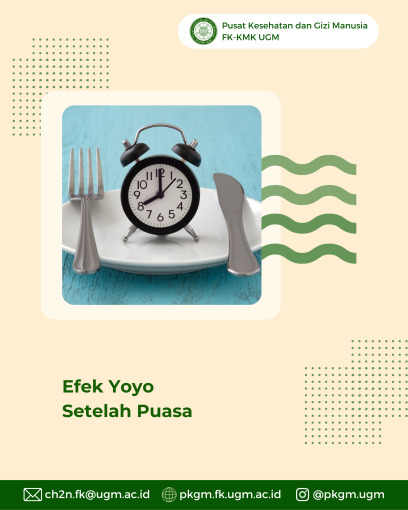
The month of Ramadan is a special month for Muslims around the world. In Ramadan, Muslims are obliged to observe fast worship with restraint from indulgence and everything that can cancel fasts such as eating and drinking from sunrise to sunset. Not only spiritual, but fasting can also have a physical effect. A study carried out in Saudi Arabia indicates that when a person fasts, the individual will also experience some changes in his daily life, such as eating habits, sleeping habits, and even metabolism in his body may change (Bahammam, 2010 in Norhasanah & Salman, 2021).
Food intake decreases while someone is fasting, as a result of a reduction in meal frequency and amount ingested, as well as a reduction in fat metabolism in the body (Norhasanah & Salman, 2021). Lower food intake during fast can result in weight loss as a result of unmatch caloric needs. Nevertheless, it is not uncommon to lose weight after a fast but also to gain weight. The phenomenon is known as the Yoyo effect (muhammad, et al., 2018). Similar to yoyo, weight loss during the fast can be restored to previous levels or even beyond their previous weight.
A study by Ismail et al. (2015) suggests that post-fasting food consumption settings can prevent yoyo effects. Food consumption arrangements need to be made so that the amount of food a person eats does not exceed his or her needs. The study also shows that motivation also plays a crucial role in preventing yoyo’s effects after fasting. Thus, it may be concluded that to prevent the yoyo effect after fasting, the frequency and amount of food consumed should be considered to suit the need, and that effort should be accompanied by strong motivation in order to produce results as expected.
References
Ismail, S. et al., 2015. Voluntary Fasting to Control Post-Ramadan Weight Gain among Overweight and Obese Women. Sultan Qaboos University Medical Journal, 15(1), pp. 96-104.
Muhammad, H. F. L., Latifah, F. N. & Susilowati, R., 2018. The yo-yo effect of Ramadan fasting on overweight/obese individual in Indonesian: A prospective study. Mediterannean Journal of Nutrition and Metabolism, Volume 11, pp. 127-133.
Norhasanah & Salman, Y., 2021. Penyuluhan Gizi Online dengan Media Video Audio Visual “Tetap Fit Saat Puasa dan Pasca Puasa dengan Gizi Seimbang”. Jurnal Abdimas Kesehatan (JAK), 3(1), pp. 33-40.
